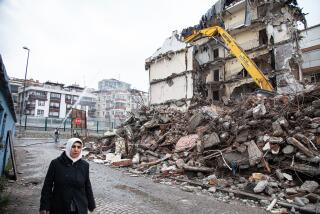Baghdad Real Estate Sizzles Amid Chaos
- Share via
BAGHDAD — On the east bank of the Tigris River, a house is for sale. An ad for it might read something like this: 10-bedroom, 14 1/2-bath riverfront beauty. Swimming pool, servants’ quarters, secure parking for eight cars. Some bullet damage on third floor. Spotty electricity. Baghdad schools. Asking $4 million.
In a nation with no mortgage lending, an estimated yearly per capita income of $1,600 and deadly attacks daily, real estate prices in the capital are flying high.
The unlikely flourishing of real estate is yet another example of how postwar Baghdad doesn’t live by the rules. People drive on the wrong side of the street. No one stops at red lights. So why should chaos and a future that is uncertain, to say the least, stop anyone from dropping six or seven figures -- cash -- on a house?
Wealthy Baghdadites, it seems, are as bullish as millions of Southern Californians when it comes to property.
Listen to a Baghdad real estate agent these days, and you’ll hear the kind of blustery zeal familiar to anyone who’s been pitched a $500,000 Altadena starter home.
“Real estate is the best investment you can make. No matter what happened to Iraq in the past, nothing affected land values. Prices will never go down,” said Amarr Samir, a real estate broker in Baghdad’s upscale Jadriya neighborhood, just across the Tigris from the heavily fortified Green Zone that houses the Iraqi government and the new U.S. Embassy.
But just like their Southern California counterparts, many Iraqis who once could afford modest houses are now priced out.
“A man who was going to get married used to be able to save for a few years, maybe sell his car and scrape together enough to buy a house. Now, it can only be a dream,” Samir said.
There is some resentment of foreigners and former Iraqi exiles, who are seen as “firing up prices. Some people are very angry,” he said.
But for Samir, it’s been a very good year. The fall of President Saddam Hussein also toppled restrictions on those who had fled Iraq -- many of whom were thriving professionals abroad -- and gave them a green light to return as residents or investors. Moneyed Iraqis who kept a low profile during the Hussein years or parked their money in banks and investments abroad began to spend it in Iraq.
Almost immediately after the war, those with means snapped up houses. And a lot of people, it turned out, had a lot of means. “Sometimes prices doubled overnight,” Samir said. “It’s unbelievable.”
Humam Shamaa, a Baghdad University economist, said that even under the 1990s economic embargo and Hussein’s strictly controlled economy, a privileged class of Iraqis amassed great wealth. They included contractors for the government, high-ranking officials and businesspeople. Shamaa estimates that 10% of the population holds 60% of the gross domestic product.
For them, real estate has long been one of the few investment choices in a nation with an undeveloped financial sector, and it was seen as a safe harbor from the uncertain value of the Iraqi dinar.
The overthrow of Hussein gave the resident elite the confidence to trade up to grander houses or break ground on mansions. The return of wealthy exiles who hoped to take government and business leadership roles -- people like the interim prime minister, president and many Cabinet members -- boosted the high-end housing market.
The hope that foreign firms will pour into Iraq once the violence calms also keeps values up.
From this combination of factors arises the paradox of Baghdad real estate: No one thinks Baghdad is a safe place to live, but plenty believe that buying a house there is a safe investment.
A sprawling, low-rise city of roughly 5 million, Baghdad has its share of slums, including Sadr City, where militiamen battled U.S. troops long after the end of the war. But the city also has large middle-class neighborhoods of modest brick houses and modern apartment blocks built by Hussein to house government workers.
It also has wealthy pockets, where commercial streets are lined with fashionable boutiques, opulent restaurants and stores filled with the latest consumer electronics products and appliances from Japan, South Korea, China and Turkey. High-end houses in these neighborhoods are often imposing two- or three-story structures behind high walls, with five to 10 bedrooms to accommodate multigenerational households.
Samir said that before the war, it was almost unheard of for a top-end house to cost more than $700,000. Now, million-dollar houses abound in Baghdad’s handful of traditionally affluent neighborhoods despite the carjackings, robberies and gunfire that have become common since the war. At the lower end, a small house or apartment that might have cost $15,000 before the war could now fetch $120,000 to $150,000.
Samir said he has sold homes to returning Iraqis and wealthy Iraqi businesspeople. Some of his customers, he said, are hawasim, looters who took part in the rampant plundering of government buildings, banks, Iraqi army bases and businesses after the war. After selling off their booty, “now they have money to spend,” he said.
Economist Shamaa said that looters may well be among those buying, but that there was no way to measure such activity.
The market has slowed since April, when fighting between insurgents and U.S. troops broke out in the cities of Najaf and Fallouja and the pace of car bombings, ambushes and assassinations picked up, observers say.
But even with softening sales, prices have not fallen, said Ihsan Shamari, a real estate broker in Baghdad’s posh Mansour neighborhood. Asked if prices would eventually fall if sales didn’t pick up soon, Shamari was adamant: “No way.” With prices holding steady even in the turmoil, he said, “all we need is a little stability, and they will double or triple.”
Shamaa said prices were not likely to fall dramatically, if at all, because “holders of real estate do not want to sell. There will not be a severe downturn.”
The economist said undeveloped land was scarce in central Baghdad. If security stabilizes, the newly liberated economy could multiply real estate prices “10 times in two to three years,” he said.
Meanwhile, the rental market has taken up some of the slack in sales, fueled by the housing needs of foreign contractors, journalists and returning Iraqis who either need a place while looking for a house or want to test the waters before resettling in Baghdad. “To Let” signs in English are all over Baghdad’s pricier neighborhoods. Real estate brokers say rentals are moving even as some contractors have fled Iraq or been killed and others have canceled plans to work in the nation.
Baghdad lawyer Salah Jamil, 59, said he received three inquiries this year from television news networks interested in renting his 10-bedroom house. The journalists were willing to pay $5,000 a month in rent, he said, but he is considering a $1-million offer to sell the house.
Jamil said he thought he could get more by holding on a few years, but added: “I don’t want to be greedy. I am satisfied with what I have. I don’t need much more in my life.” He has lived in the house since it was built three years ago. At the time, it was appraised at $250,000, he said.
Construction of ever more opulent houses, meanwhile, goes on with gusto.
Across the Tigris from Hussein’s former palace, Ahmed Kazaz, 38, is building a four-bedroom, five-bathroom house on land his family left vacant for more than 25 years. “They didn’t want you to build anything overlooking the palace,” Kazaz said of Hussein’s government. Even if they could have built a house, he said, his family risked having it seized by a top official who might fancy it for himself.
Kazaz said that after hiring a lawyer, his family finally got a building permit in 2002. Even then, the family was told that there was no guarantee the house would not be confiscated.
Now, Kazaz appears to be sparing no expense. His house will have spiral staircases, central air conditioning, underground parking and a swimming pool, he said.
Kazaz, who attended graduate school in Texas and runs a commercial fish farm and chicken ranch, said that one reason he was building was that there weren’t many places to put one’s money in Iraq. The stock market has yet to reopen, and bonds or other investment funds are nonexistent.
Abdul Rahman, a 36-year-old electrical engineer, is building adjoining houses for himself and his younger brother, a dentist. Rahman enthusiastically takes visitors through his work in progress. There are granite kitchen counters, stained-glass skylights and Jacuzzi bathtubs.
The two houses are connected by a courtyard. “We can make a party there,” Rahman said cheerfully. Then, showing his guests the master bedroom suite, he pointed out with special pride a tangle of cables sticking out of a wall. “The whole house will be networked,” he said.
Rahman is well aware of the potential pitfalls of building one’s dream house in Iraq. Along with the absence of homeowners’ insurance, there is also the danger of “thieving and looters, even the U.S. Army. Maybe they will invade my house and damage it with their tanks,” he said.
But, he said, in the long term, the value of his house could weather even those catastrophes.
Could anything sink Baghdad’s real estate ascendancy?
“Maybe civil war,” he said.
Even though he says he thinks that is a very real possibility, it won’t change his building plans. “We believe in God,” he said. “When he wants to take us, he will take us at any time.”
*
Caesar Ahmed and Ziad Hussein of The Times’ Baghdad Bureau contributed to this report.
More to Read
Inside the business of entertainment
The Wide Shot brings you news, analysis and insights on everything from streaming wars to production — and what it all means for the future.
You may occasionally receive promotional content from the Los Angeles Times.










